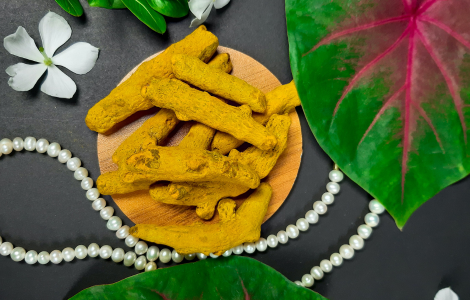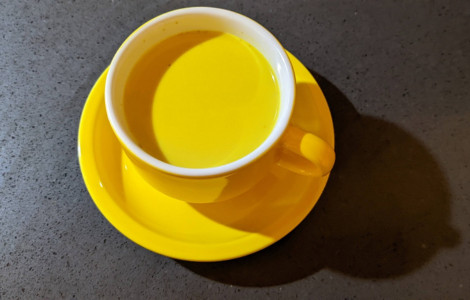Embarking on an intermittent fasting journey requires navigating the intricacies of what can disrupt or support your fasting goals.
In this exploration, we turn our attention to the golden spice, turmeric, and its potential impact on intermittent fasting.
Table of Contents
ToggleUnderstanding Intermittent Fasting
Let’s get one thing clear: intermittent fasting isn’t a diet, it’s a feeding pattern. It revolves around the principle of eating within a certain period, followed by a fasting period.
It’s a bit like musical chairs, but instead of grabbing a seat, you’re grabbing a snack! Hold the chuckling, though, because the health benefits are no joke!

The Feasibility of Turmeric Intake: Can I Drink Turmeric Tea and Have Turmeric Milk During Intermittent Fasting?
But wait a moment, can I add some turmeric to my drink while fasting?” you ask. Well, strap in because we’re about to dive headfirst into peppery, golden details!
It’s no secret that turmeric is hailed as a nutritional panacea. But as with any great superhero, context matters! The short answer? Yes, you can have turmeric-infused drinks during fasting. The long answer? Read on, my friends!
- Even in fasting, your body can benefit from turmeric’s anti-inflammatory properties.
- Turmeric can maintain gut health, which is crucial during fasting.
- Though it packs a punch, turmeric isn’t calorically intense, ensuring your fast remains unharmed.
- Discovering the Impact: How Can Turmeric Affect My Intermittent Fasting Results?
Consistent intermittent fasting can lead to downright fabulous results. Now, stir turmeric into the mix, and you’ve got a wellness cocktail with a golden twist. But how exactly does turmeric influence your fasting results?
- Turmeric’s active compound, curcumin, may aid in weight loss during fasting.
- By easing digestion, it can make the fasting period more comfortable.
- Turmeric can aid in regulating blood pressure, which often fluctuates during fasting.
- Pulling from the experiences of our fasting community, we find Abby who notes, “Adding turmeric to my fasting regime made me feel more energetic.
My digestion also improved substantially!” A fellow faster, Ben adds, “I noticed better sleep patterns when I started drinking turmeric tea during my fast.
Indeed, the golden spice seems to sprinkle its magic into the fasting saga, proving that it might just be the sidekick your fasting journey needs. Don’t forget though, everyone’s body is different! Experiment and find your optimal rhythm.
For more on this, take a peek at Healthline’s take on Turmeric & Intermittent Fasting.
The Feasibility of Turmeric Intake: Can I Drink Turmeric Tea and Have Turmeric Milk During Intermittent Fasting?
Detailed Examination of Intermittent Fasting Guidelines
Intermittent fasting pivots on scheduled eating and fasting intervals. Does Turmeric Break Intermittent Fasting within these periods?
| Intermittent Fasting Method | Turmeric Consumption |
|---|---|
| 16/8 Method | Optimal during the 8-hour eating period |
| 5:2 Diet | Restricted to 2 non-consecutive fasting days |
The type of intermittent fasting regime significantly dictates turmeric intake.
Turmeric, when consumed within eating intervals, doesn’t break the fast.
Turmeric-infused Beverages: Weighing the Pros and Cons
Turmeric tea brings numerous health benefits and based on low-calorie content, it theoretically doesn’t disrupt fasting.
However, debates persist around the influence of turmeric tea on insulin levels.
- Pro: Turmeric tea packs a total calorie count of just 8 calories per cup.
- Con: Turmeric could potentially spike insulin, which would technically break the fast.
- Pro: Turmeric possesses anti-inflammatory properties, which boost wellness during fasting.
Does Turmeric Break Intermittent Fasting if consumed in tea form?
The verdict leans towards no, provided one doesn’t overload on turmeric.
Discovering the Impact: How Can Turmeric Affect My Intermittent Fasting Results?
Identifying the Influencing Factors: Turmeric and Fasting Results
So, Does Turmeric Break Intermittent Fasting? At a glance, turmeric doesn’t breakfast. It’s a spice with little to no calories. However, the way it’s consumed can make a difference.
Autophagy – the natural detox process in your body – can be affected by any outside substance. Here, let’s break down it.
| Consumption Style | Calorie Count | Impact on Fasting |
|---|---|---|
| Turmeric Tea | Minimal (Near Zero) | No impact – Your fast continues |
| Turmeric Milk | Minimal to High (Depending on additives) | Possible impact – Might breakfast if high-calorie additives are used |
Real-life Stories: Insights from the Fasting Community
The intermittent fasting community has diverse views on the impact of turmeric on fasting.
Let’s have a look at what some experienced fasters have to say:
- Many fasting veterans believe turmeric in modest amounts doesn’t break a fast.
- For others, having turmeric tea is an essential part of their fasting routine.
- Some people feel more energized and report better weight loss results when consuming turmeric while fasting.
- However, there is a set of fasters who notice no significant effects of turmeric on their fasting results.
- Last, some skeptics consider any intake, including turmeric, a potential fast breaker.
So there you have it, a piece of the pie of the fasting community’s interaction with turmeric.
Just remember, Does Turmeric Break Intermittent Fasting? The answer may largely depend on subjective experiences.
What Happens to Your Body: What Happens If I Consume Turmeric While Fasting?
The Biological Impact of Turmeric on a Fasting Body
Intermittent fasting and the consumption of turmeric seemingly have a unique kinship, creating an intriguing dynamic in your body.
Consuming turmeric while fasting doesn’t add significant calories and doesn’t derail your weight loss efforts.
| Factors | Turmeric Intake | Fast State |
|---|---|---|
| Caloric Impact | Minimal | Metabolism relies on existing energy stores |
| Inflammation | Reduces systemic inflammation | Decreases inflammation over long fasting periods |
| Antioxidant Capacity | Increases the body’s antioxidant capacity | Enhances cell’s ability to resist oxidative stress |
You can observe from the table that a prominent effect of turmeric is its potent anti-inflammatory and antioxidant functions.
An In-depth Look at the Biochemical Changes
Despite the overwhelmingly positive effects, the question remains, “Does Turmeric Break Intermittent Fasting?”
- One side of the coin suggests that turmeric merely aids the fasting process by reducing inflammation and promoting cellular resistance against oxidative stress.
- The other side argues that any substance that isn’t water potentially triggers an insulin response, possibly interrupting the fast.
- However, current research indicates that turmeric doesn’t appear to stimulate an insulin response, providing a potential answer to “Does Turmeric Break Intermittent Fasting?”.
This debate raises the importance of individual responses to fasting and the subsequent need for personal experimentation, improvements, and adaptations.
Timing is Very Important (When to Consume Turmeric): What is the Best Time to Consume Turmeric While on a Fast?
Understanding Your Body’s Rhythm: The Ideal Time for Turmeric Intake
Your body has its unique rhythm and figuring out the best time to consume turmeric during fasting relies on understanding it.
While some studies indicate that the body absorbs curcumin, the active ingredient in turmeric, better in the morning, others suggest that it’s best taken in the evening.
| Morning | Evening |
|---|---|
| Helps kickstart your day, and the antioxidants are high in demand in the morning. | May help in winding down your day, potentially improving sleep. |
Fact-Checking: Debunking the Myths
You may have heard several theories on turmeric intake’s timing during fasting but knowing the facts is crucial.
“Does Turmeric Break Intermittent Fasting?” is the question many ask, but misconceptions abound.
- Does consuming turmeric in the morning break intermittent fasting? Not, as long as it’s calorie-free.
- Will the bioavailability of curcumin be higher in the evening? There’s no solid research to support this claim.
- Can you consume turmeric multiple times a day during a fast? Yes, but make sure it does not contain any added sugars or fats.
Remember, the ultimate answer to “Does Turmeric Break Intermittent Fasting?” is largely based on your metabolic response.
Supplements and Fasting: Does Taking Turmeric Supplements Break My Fast?
Since Pills are Not Beverages: Are Turmeric Supplements Different?

Whether you’ve wondered, “Does Turmeric Break Intermittent Fasting?” or not, it’s important to understand how supplements, like turmeric pills, factor in.
Turmeric supplements tend to contain a concentrated form of the plant’s active compound, curcumin.
As such, it might have a different effect on fasting than, say, a turmeric-infused tea.
| Turmeric-infused Tea | Turmeric Supplement (Pills) |
|---|---|
| Formulated with whole turmeric root and therefore less concentrated. | Typically contains concentrated curcumin, making it potentially more potent. |
| Can be sipped slowly, providing a gradual intake of turmeric. | Taken all at once, offering a bulk dose of turmeric. |
Still, the answer to the question, “Does Turmeric Break Intermittent Fasting?” depends on several factors, including the specific guidelines of your fasting program.
The Science Behind Supplements During Fasting
When considering how turmeric can impact your fasting regimen, you need to evaluate the scientific data. Literature reveals that calorie-free or low-calorie supplements likely won’t impact fasting.
This is because the primary purpose of fasting is to create a calorie deficit, prompting weight loss and other benefits.
- Some experts believe that supplements, even if they have a negligible caloric count, can potentially disrupt some of the metabolic benefits of fasting.
- Others argue that a low enough calorie supplement won’t manifest a significant impact on the overall results of fasting.
- If you’re fasting for specific health reasons, it’s best to consult with a health professional. Visit the World Health Organization for more resources.
Indeed, whether or not turmeric, in any form, breaks your fast can vary depending on the type and purpose of your fasting regimen.
Potential Benefits and Adverse Effects: Can Turmeric Help Enhance the Effects of Intermittent Fasting, and Does it Have Any Side Effects?
Turmeric: A Powerful Ally or a Hidden Enemy in Fasting?
We’ve arrived at a critical juncture in our discussion: assessing whether turmeric is a friend or foe when it comes to fasting.
Turmeric could indeed be a powerful ally in your intermittent fasting journey due to its anti-inflammatory and antioxidant properties.
These properties may boost the overall effects of your fast. However, despite its potential benefits, the question remains: Does Turmeric Break Intermittent Fasting?
| Role of Turmeric in Fasting | Potential Benefits | Possible Drawbacks |
|---|---|---|
| Anti-inflammatory | May enhance fasting benefits | Could trigger stomach upset |
| Antioxidant | Could support cellular health | This may lead to the overconsumption of curcumin |
Side Effects of Turmeric: When It’s More Harmful Than Helpful
It is also essential to mention the potential drawbacks that might be encountered. It is believed that excessive consumption of turmeric could lead to gastrointestinal issues such as stomach upset, nausea, or diarrhea.
In rare cases, it may contribute to the formation of kidney stones in some individuals.
- Skin irritation if applied topically in excess.
- Heartburn or indigestion if consumed in large amounts.
- Potential risk of bleeding due to its blood-thinning properties.
Let’s not forget the key question: Does Turmeric Break Intermittent Fasting? For safe and optimal use of turmeric during fasting, it is recommended to refer to reliable sources like Healthline.com.
Concluding Thoughts: How Can I Incorporate Turmeric into My Diet Without Breaking My Intermittent Fast?
Tips and Tricks: How to Safely and Beneficially Use Turmeric in a Fasting Diet
As you explore the intermittent fasting journey, you may have a common question, Does Turmeric Break Intermittent Fasting?
Here are some tips on how to include turmeric without disrupting the fasting process.
| Tips | Description |
|---|---|
| Include Turmeric in Pre-fast Meals | Adding turmeric to your last meal helps in digestion and reduces inflammation. |
| Have Turmeric Tea in the Fasting Window | Turmeric tea often contains zero calories, making it fasting-friendly. |
The key is to ensure that any form of turmeric consumption isn’t high in calories.
This allows for beneficial turmeric intake without interfering with your fast.
Recap: What We Have Learned About Turmeric and Intermittent Fasting.
Does Turmeric Break Intermittent Fasting? Not necessarily, if consumed wisely.
Here’s a quick recap on this topic:
- Turmeric serves as an inflammatory and antioxidant agent.
- Calories in turmeric are too low to interfere with a fast.
- Turmeric supplements may affect a fast if they contain additional calories.
- Timing matters – consuming turmeric just before starting a fast can be optimal.
Remember, everyone’s body responds differently to fasting and the inclusion of various foods or supplements.
Always listen to your body and consult with a healthcare professional before beginning any new dietary regimen.
Conclusion
In conclusion, incorporating turmeric into your intermittent fasting diet can be a great idea if done correctly.
By understanding the guidelines of intermittent fasting and the potential impact of turmeric on your fasting results, you can make informed decisions about when and how to consume this yellow spice.
When it comes to timing, it is important to consider your body’s rhythm and find the ideal time to consume turmeric.
Debunking the myths, it is clear that consuming turmeric during the fasting window does not break your fast, as long as it is consumed in the form of turmeric-infused beverages or whole turmeric.
Taking turmeric supplements, on the other hand, can have a different impact on your fasting state.
While they may not break your fast in terms of calorie intake, some supplements can trigger metabolic responses that may interfere with the benefits of fasting.
Turmeric offers potential benefits in enhancing the effects of intermittent fasting, such as reducing inflammation and boosting antioxidant activity.
However, it is important to note that some individuals may experience side effects from consuming turmeric, such as digestive issues or allergic reactions.
It is essential to listen to your body and consult with a healthcare professional if you have any concerns.
To safely and beneficially incorporate turmeric into your fasting diet, consider using turmeric in whole form or as a natural spice, rather than relying solely on supplements.
You can experiment with turmeric-infused beverages like turmeric tea or turmeric milk, and find creative ways to incorporate turmeric into your meals.
In summary, turmeric can be a powerful ally in your intermittent fasting journey if you consume it mindfully and by fasting guidelines.
By understanding the potential impact and timing of turmeric consumption, you can unlock the benefits of this golden spice without compromising your fasting results.
So go ahead and spice up your fasting with some turmeric, and enjoy the flavorful and health-boosting benefits it has to offer!
Frequently Asked Questions
Does Turmeric Break Intermittent Fasting?
Turmeric does not break intermittent fasting as it is calorie-free and does not contain any macronutrients that would disrupt the fasting state.
However, it is important to consume turmeric in its pure form without any added sugars or fats to ensure it does not break your fast.
Can I Drink Turmeric Tea and Have Turmeric Milk During Intermittent Fasting?
It is generally permissible to drink turmeric tea or have turmeric milk during intermittent fasting.
As long as these beverages do not contain added sweeteners or other calorie-containing ingredients, they should not break your fast.
However, it’s always important to check the ingredient labels and ensure adherence to fasting guidelines.
How Can Turmeric Affect My Intermittent Fasting Results?
Turmeric can potentially enhance the effects of intermittent fasting by providing anti-inflammatory and antioxidant benefits.
Additionally, turmeric may aid in weight loss and improve metabolic health, which are common goals of intermittent fasting.
What Happens If I Consume Turmeric While Fasting?
Consuming turmeric while fasting can have various benefits, such as reducing inflammation, improving digestion, and supporting overall health.
It does not interfere with the fasting state but rather adds additional health benefits to your fasting regimen.
What is the Best Time to Consume Turmeric While on a Fast?
The best time to consume turmeric while on a fast depends on your personal preference and fasting schedule.
Some people prefer taking turmeric with their meals, while others find it more effective to take it during their fasting window to maximize its potential benefits.
Does Taking Turmeric Supplements Break My Fast?
Turmeric supplements, in general, do not break your fast as they are typically calorie-free.
However, it’s essential to check the supplement’s ingredients and ensure it does not contain any additional additives or fillers that may contain calories and potentially disrupt your fast.
Can Turmeric Help Enhance the Effects of Intermittent Fasting, and Does it Have Any Side Effects?
Turmeric can indeed help enhance the effects of intermittent fasting by providing anti-inflammatory and antioxidant properties.
However, some individuals may experience mild side effects such as digestive discomfort or allergies. It’s always best to start with small amounts and monitor your body’s response.
How Can I Incorporate Turmeric into My Diet Without Breaking My Intermittent Fast?
To safely incorporate turmeric into your fasting diet, opt for pure turmeric powder or fresh turmeric root. Avoid turmeric products that contain added sugars or fats.
You can use turmeric in cooking, mix it with warm water as a beverage, or add it to smoothies during your eating window to enjoy its health benefits while fasting.
